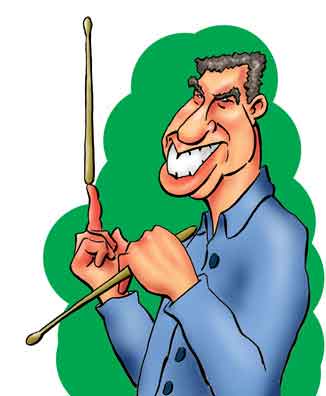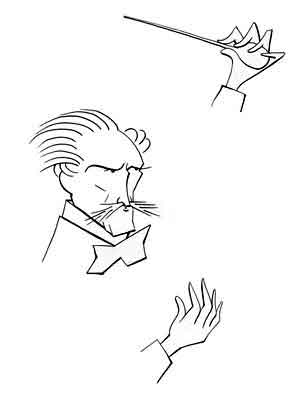Buddy RichThe Best?

Buddy Rich
There is a syndrome common amongst critics, commentators, authors, and - yes, assistant professors - called the Assistant Professors Syndrome. This is where you have to come up with something new to write about. But since almost everything has already been written about, you have to find something new about what's already been written. And to do this it's simple. Just look at what was written by the last generation, and write that what really happened was the opposite. Then go through and cherry pick what you need to prove your point.
So it's no surprise that nowadays you'll read that critics grump that Buddy Rich, far from being the best drummer ever and who influenced generations of younger musicians, was merely an entertainer. But whether such judgement has merit or if Buddy was the best drummer of all times is something we will not decide here. But at least we can say that Buddy was certainly one of the best drummers of all and clearly the best entertaining-drummer of all time.
Although he had already been in the business for over forty years, it was from his appearances and interviews on the Tonight Show in the 1960's and 1970's that Buddy became known to the Rock Generation Baby Boomers. But he had been featured in motion pictures long before. He was the drummer for Artie Shaw when Artie's band appeared in Dancing with Co-Eds in 1937 and for Tommy Dorsey when Tommy played in Las Vegas Nights four years later.
But if anyone remembers Buddy from the classic movie days it's for his interaction in Ship Ahoy (1942) with dancer Eleanor Powell. Buddy shows skill and dexterity, but we have to admit it's Eleanor who steals the show. And yes, that is Bert Lahr - the "Cowardly Lion" from the Wizard of Oz - that we also see in the scene. Bert is credited; Buddy is not.
Although a middle school band director once sternly told his students that all musicians of any ability read music, Buddy proves that is not, of course, correct. He never could read music and if he needed to learn something off sheet music he would have another drummer play it first. His musical facility developed without reading because after all, Buddy had been playing the drums - literally - before he could read.
Bernard Rich was born on September 30, 1917, and he began appearing on stage when he was four. Billed as "Traps, the Drumming Wonder" by his vaudeville parents, by six he was touring internationally. At twenty Buddy was an established in-demand drummer for the biggest of the Big Band bands, and by the time he was thirty he was one of the highest paid musicians in the business. Of course in the 1950's Buddy made the shift to the smaller combos as the Bebop Era moved in, and he also began to issue his own recordings.
Then in 1966 Buddy formed his own Big Band. This went against all wisdom. After all this was the era of rock and roll, and the hippies - then still called "beatniks" - had settled in San Francisco's Haight and Ashbury Streets. A big band was too expensive to run, everyone said.
Surprisingly it worked. Although Buddy was plagued with tax problems, the band was even popular with the younger crowd who, far from simply embracing hard rock, were also still buying Frank Sinatra records. Those who saw the band were struck by the youth of the instrumentalists and how they were decked out in beards and "hippie" style apparel. Buddy himself sometimes sported the short-lived Nehru jackets and love-beads of the era. Nor did the repertoire confine itself to Glenn Miller songs but included adaptations of the current popular tunes. The band was active until Buddy died the day after April Fool's Day, 1987.
So it's ironic that for today's Internet Crowd, Buddy is best known for his - ah - "performances" on The Buddy Rich Tapes. There was no music in these recordings surreptitiously miked by a band member. Here we hear Buddy - quote - "inspiring" - unquote - his band members to greater artistry. You can find both the tapes and the transcripts with a click on a search engine so there is no need to provide them here.
The musicians who received Buddy's instruction do not seem to have been particularly perturbed by his méthode. They were, after all, top-notched musicians themselves, and some - although acknowledging that Buddy was one of the best drummers - pointed out he was not perfect either.
The trouble of a top-notch musician leading top-notched musicians is they probably already know what they're being taught. Sir Thomas Beecham had the right philosophy. Just let 'em play the piece and don't waste your time trying to "educate" anyone. A couple of runs-through and the players will correct their own mistakes.

Arturo Toscanini
Not as important as you might think.
Although tyrannical conductors make for good musician jokes, they don't necessarily impress the musicians themselves. One journalist interviewed members of an orchestra conducted by Arturo Toscanini, wondering what it meant to play for one of the greatest musical Titans in history. He was surprised to learn it didn't mean that much.
Instead, the players tended to focus on how Arturo's personality actually hindered their efficiency. For instance, only after making them play a passage repeatedly would Toscanini ask, "Is there not an accent?" Why, the musicians wondered, waste their time like that when he could have corrected the error in two seconds? Likewise his much vaunted and explosive tantrums simply took up time that could have been better spent rehearsing.
A frequent gripe of Buddy was about miscues and incorrect timing and inconsistent tempos. But one musician who played with Buddy in the 1960's said that Buddy himself tended to rush the beat. He also could throw the band off by changing his own part without notice - not unusual for musicians who play by ear. So on a drum solo the band had no idea when to come back in. The player finally told Buddy to just play the drums and let them worry about the music.
On the other hand, a lot of the rants were for show. Once after a gig, Buddy again lit into the band, and after his railings he turned to his lead trumpet player. "You!" he said. "In my office. NOW!
When the door closed, Buddy smiled and said, "I just like to keep them on their toes."
One thing Buddy did have was confidence. There's the story that after Buddy died, another jazz musician was about to enter Heaven. As he met St. Peter he suddenly heard the greatest drum solo coming from the other side of the gates.
"Is that Buddy Rich?"
"No," said St. Peter. "It's God."
Then dropping his voice to a whisper, St. Peter added, "He just thinks he's Buddy Rich."
References
Traps, the Drum Wonder: The Life of Buddy Rich, Mel Tormé, Oxford University Press, 1991. Yes, Oxford University Press. And yes, Mel Tormé. This is the authorized biography.
"Bobby Shew on Buddy Rich", Marc Meyers, Jazz Wax, February 25, 2012. Web.
"Buddy Rich's Famous Tirade on the Bus", Bob Sutton, Work Matters, Web.
The Toscanini Musicians Knew, Bernard Haggin, Horizon Press, 1967. Reprinted in one volume with the Conversations with Toscanini (Bernard Haggin, Doubleday, 1959) in Arturo Toscanini: Contemporary Recollections of the Maestro, Bernard Haggin and Thomas Hathaway, Da Capo Press, 1989.